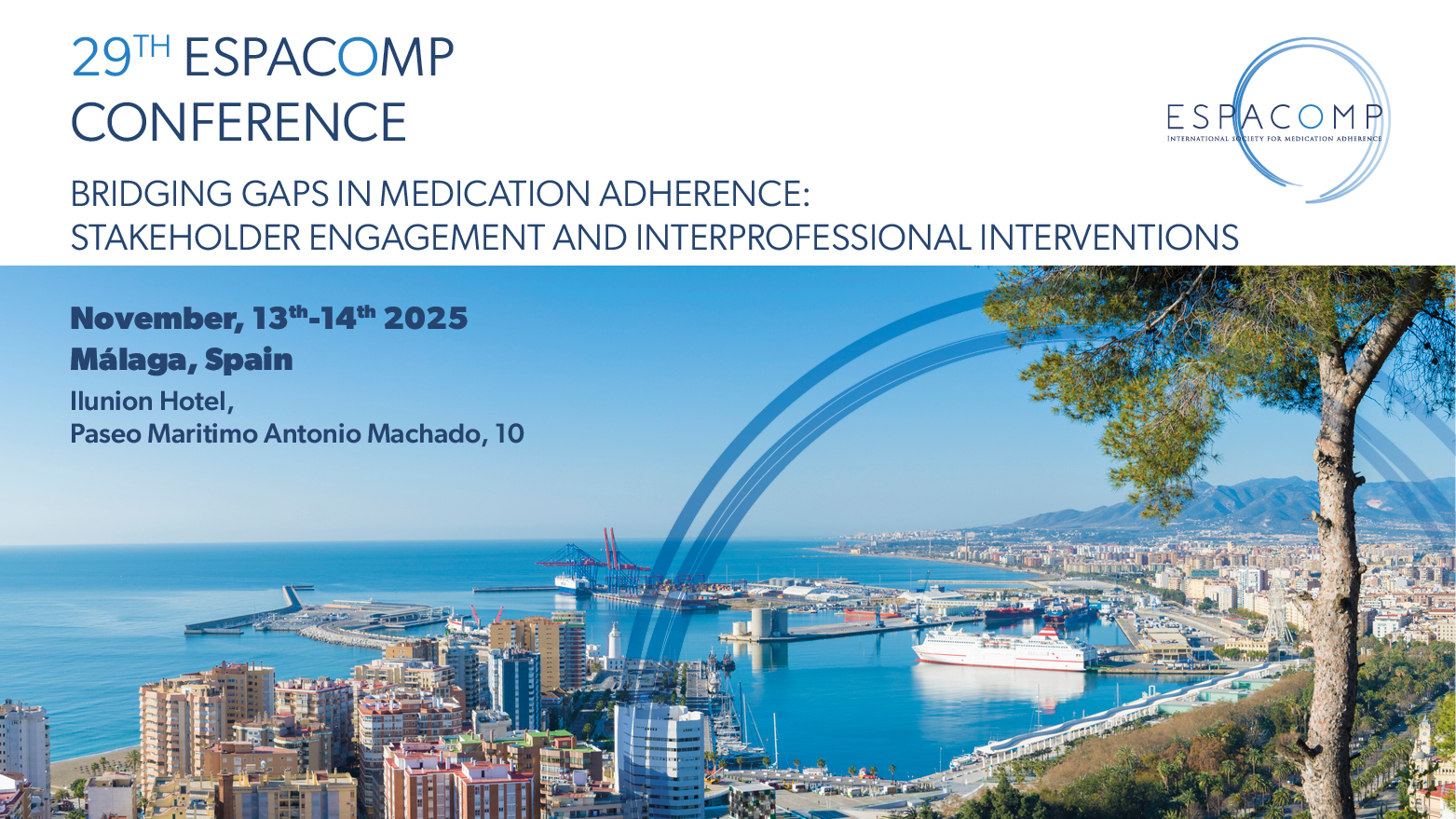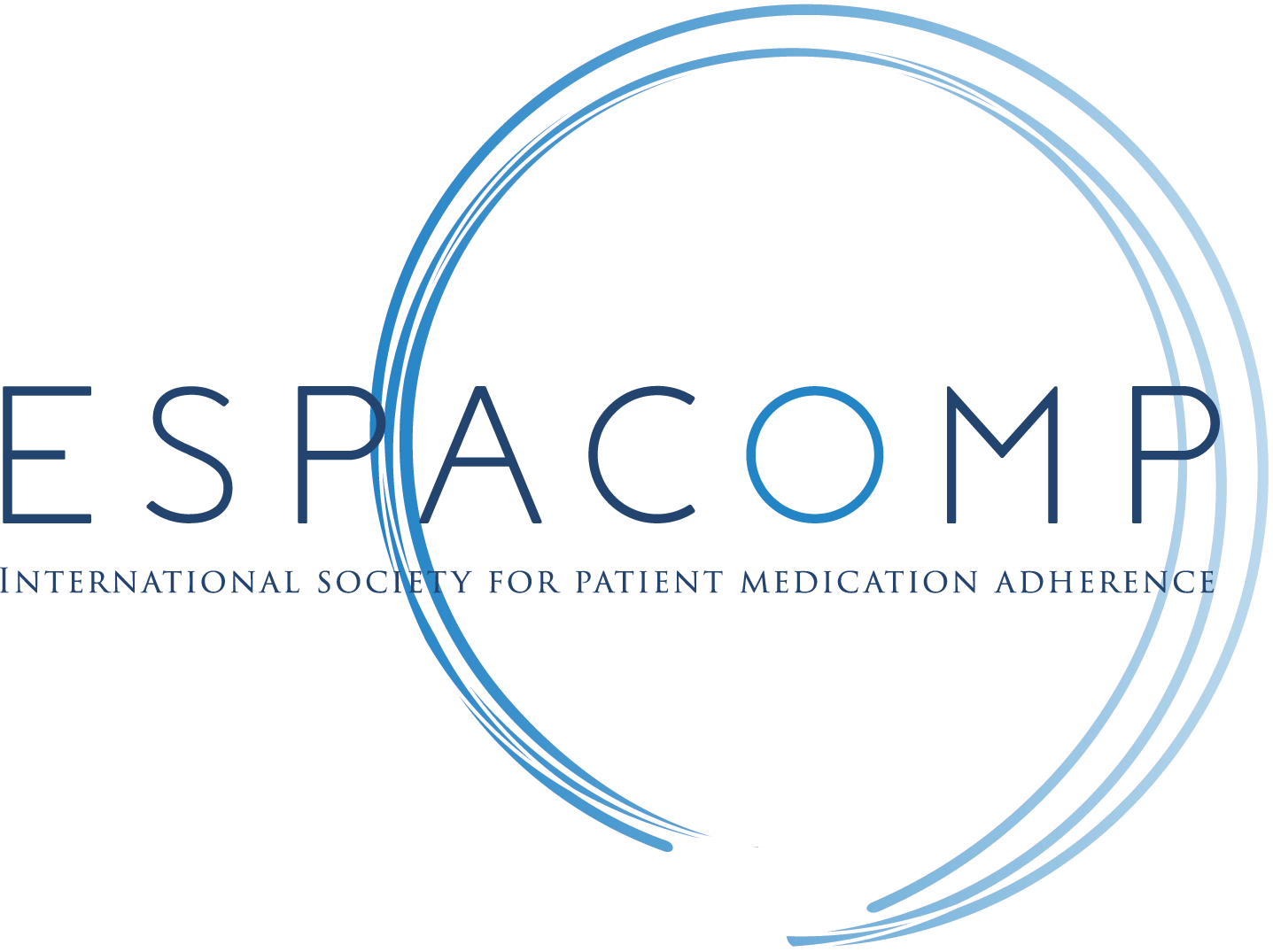Upcoming Meeting
29th ESPACOMP Conference
November 13-14, 2025 | Málaga, Spain

Conference Theme
Bridging Gaps in Medication Adherence:
Stakeholder Engagement and Interprofessional Interventions
Conference Location
The annual meeting will be at the
Hotel ILUNION Málaga
Paseo Maritimo Antonio Machado, 10 – Málaga, Spain
The Conference Dinner will be hosted at “El Pimpi” Calle Granada, 62, Calle Alcazabilla – 29015 Málaga, Spain.
Download travel information here!
Photos below are property of the Málaga City Council Tourism Department
Conference Workshops
Two workshops will present cutting-edge information and methods of Implementation Science and Engaging Stakeholders in medication adherence research.
Read the links below for more information about the workshops!
Workshop: Implementation Science
In-person Workshop: Wednesday, November 12, 2025
Workshop: Engaging Stakeholders
In-person Workshop: Wednesday, November 12, 2025
Conference Registration and fees
Full time student
Academic, healthcare providers, non-profit or public sector employees
Commercial sector employees
Membership and conference
Early Registration: €350 (until 15 Oct)
Late Registration: €450 (after 15 Oct)
Social Dinner: €60
Membership and conference
Early Registration: €475 (until 15 Oct)
Late Registration: €625 (after 15 Oct)
Social Dinner: €60
Membership and conference
Early Registration: €850 (until 15 Oct)
Late Registration: €1,050 (after 15 Oct)
Social Dinner: €60
To register multiple participants from the same institution or any for queries related to registration and payment, please contact the meeting secretariat at: info@espacomp.eu
Keynote Speakers

John Urquhart Memorial Lecture
The future of medication non-adherence: are we ready to learn from past pitfalls?
Prof. Przemyslaw Kardas, Medical University of Lodz, Poland
Prof. Przemysław Kardas, MD, PhD is the founder and Director of the Medication Adherence Research Center at the Medical University of Lodz, Poland, where he also serves as Professor and Head of the Department of Family Medicine. He is a founding member and current Executive Committee member of the International Society for Patient Adherence, Compliance, and Persistence (ESPACOMP), which he previously chaired. Prof. Kardas has led several major EU-funded research projects on medication adherence, including the seminal ABC Project (FP7), which developed the standard terminology and taxonomy of adherence, and SKILLS4ADHERENCE, which delivered the first-ever online educational program in this field. He has also played a key role in fostering international collaboration among stakeholders active in medication adherence. He was the promoter of a dedicated action group within the European Innovation Partnership on Active and Healthy Ageing (EIP on AHA) and served as Vice-Chair of a Working Group within the COST Action ENABLE. His interdisciplinary research bridges digital health, Big Data, and Artificial Intelligence with ecology and healthcare sustainability. He has authored over 130 peer-reviewed publications, as well as multiple monographs and book chapters, and has served as guest editor of several adherence-focused special issues in scientific journals. Prof. Kardas is actively involved in scientific consulting and health policy development at both national and international levels. His work continues to bridge science, policy, and clinical practice to improve medication use and health outcomes, particularly among ageing populations.

Plenary Lecture
Empowering patients, co-creating solutions: a partnership for long-term treatment commitment
Sandrine Lavallé, European Patients’ Academy (EUPATI), Luxembourg
Sandrine Lavallé is a strong advocate for involving patients in research and healthcare decisions. With a background in communication and sociology, she has always believed in the power of dialogue. After supporting her partner through glioblastoma in 2013 and facing breast cancer herself in 2017, she realised how important it was to build real bridges between patients, doctors, and researchers. So they can understand each other and co-create better solutions.
At this time, she was already working at the Luxembourg Institute of Health (LIH) in health prevention. These personal experiences led her to shift her focus. Trained by the European Patients’ Academy (EUPATI), she started raising awareness internally, encouraging more collaboration with patients, and helping establish a Patient and Public Involvement (PPI) structure at the institute. Over time, this approach became part of her official role, and she now coordinates PPI activities at LIH.
Today, as Chair of the EUPATI National Platforms Cluster, she also contributes to strengthening patient involvement across Europe.

Plenary Lecture
Addressing medication non-adherence is a partnership between the patient and practitioner: whose behaviour do we need to change?
Prof. Debi Bhattacharya, University of Leicester, UK
Debi is Professor of Behavioural Medicine at the University of Leicester and a primary care pharmacist. Debi leads a portfolio of research applying behavioural science to medicine-related challenges. Her work includes both patient and practitioner behaviour change with two key strands being supporting deprescribing and medication adherence. Debi led development and validation of the Medication Acceptability Questionnaire (MAQ) for which licences have been awarded to over 100 different research organisations internationally. The MAQ is being used by several pharmaceutical companies in phase 2 and 3 trials to support developing new medicines and formulations that meet the needs of patients. Debi also developed the Opioid Toolkit to equip organisations to support prescribers to stop long-term opioids when the chance of harm outweighs benefit. Licenses to use the Opioid Toolkit have been provided to over 1,800 different healthcare organisations representing all continents. Most recently, Debi led development and validation of the Identification of Medication Adherence Barriers Questionnaire (IMAB-Q) which is a 10-item evidence and theory-based questionnaire validated to accurately diagnose an individuals main barriers to adherence. Large research programmes that Debi is currently leading include: – CHARMER which is a five year, £2.4M NIHR funded research programme to design and test a deprescribing intervention in a cluster-randomised controlled trial across 24 hospitals in England. – IMAB-Qi which is a five year, £2.7M NIHR funded research programme to design and test a medication adherence intervention in a cluster-randomised controlled trial across 38 medical practices in England. Debi is also passionate about research capacity building to secure the future of evidence-based healthcare. She is currently leading the National Institute of Health and Care Research supported incubator for pharmacy professionals which is three years of funding to build research capacity amongst the pharmacy profession.

Plenary Lecture
Sustainable implementation of digital health tools for behavior change: a focus on adherence
Prof. Lisa A. Marsch, Dartmouth Center for Technology and Behavioral Health, US
Dr. Lisa A. Marsch is the Founding Director of the Dartmouth Center for Technology and Behavioral Health (CTBH), a designated “Center of Excellence” supported by the U.S. National Institutes of Health. She is also the Director of the Northeast Node of the National Drug Abuse Treatment Clinical Trials Network and the Andrew G. Wallace Professor within the Departments of Psychiatry and Biomedical Data Science at the Geisel School of Medicine at Dartmouth College. CTBH is an interdisciplinary Center housed at Dartmouth and includes partners across the U.S. and internationally. This Center uses science to inform the development, evaluation, and sustainable implementation of digital therapeutics and other digital health tools for behavior change targeting a wide array of populations and health behaviors. These tools are designed to deliver engaging and effective health monitoring and health behavior interventions anytime and anywhere and to collectively lead to transformations in the delivery of science-based health care.





